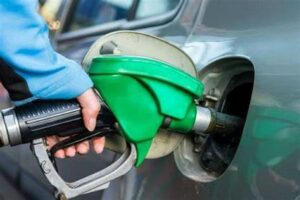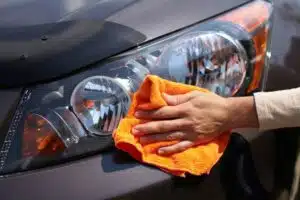Gasoline is the lifeline of any car with an internal combustion engine. But, have you ever found yourself at the gas station, staring at your car’s shiny paint job and wondering if gasoline could harm it?
It is a valid concern – gasoline is a powerful chemical that can dissolve plastic and rubber.
So, does gasoline damage car paint?
Of course, a vehicle’s appearance is a point of pride for drivers.
Let’s investigate this curious inquiry!
Does Gasoline Damage Car Paint?

The short answer is yes – gasoline contains chemicals such as ethanol, methanol, and benzene, which are highly corrosive and can eat away at the transparent coat layer of your car’s paint job.
When gasoline comes into contact with your vehicle’s surface, it breaks down the protective layers designed to keep your paint shiny and new.
This can lead to discoloration, dullness, and even peeling over time.
If left unchecked for too long, gasoline damage can result in rust spots on your finish.
So, from now on, beware while filling up your car’s tank!
Does Gasoline Damage Clear Coat?
Yes! We know fuel spills are the main reason for damaging the clear coat.
So, when gasoline spills onto your car’s surface, it can strip away the protective layer of wax and polish that keeps your vehicle looking shiny and new.
Over time, your car is vulnerable to scratches and other damage that can wear away at the clear coat.
If gasoline accidentally spills on your vehicle, rinse it off quickly with water.
Gasoline evaporates quickly, which means if you leave it sitting in your car for too long, it will have more time to penetrate the clear coat and cause damage.
How To Remove Gasoline From Car Paint?

The good news is that the right tools and techniques can easily remove gasoline spills.
So, fear not! I have tips for that.
- The first step in removing gasoline from your car’s paint is to act quickly. The longer you leave gasoline on the surface of your vehicle, the more damage it will cause. Begin by wiping off as much of the wetness as possible using a clean cloth or paper towel. However, avoid rubbing too hard, which could lead to scratches and further damage.
- Next, use warm water and dish soap solution to wash away any remaining gas residue gently.
- Mix mild dish soap with warm water in a bucket and use a soft sponge or cloth soaked in the mixture to scrub the affected area lightly.
- Use clean water to rinse the region entirely and eliminate any soap residue.
- After rinsing, gently pat dry with a clean towel or cloth.
If you are ever in doubt, don’t hesitate to seek the help of a professional detailer.
With these tips, you can keep your car looking its best after accidental spills.
What Eats Away Car Paint Fast?
Your car is an investment that you want to last for years. Your car paint can be damaged by things other than gasoline.
Some substances are known for being particularly harsh on car paint and can eat away at it much faster than gasoline specifically.
- One of the most common culprits of fast car paint erosion is acid rain. This type of precipitation contains higher acidity levels than regular rainwater due to air pollution, which causes chemical reactions that deteriorate the car’s exterior finish.
- Road salt is another substance that quickly eats away at car paint because it contains sodium chloride, which corrodes metal and oxidizes pigment. It is used to melt snow on roads in winter.
- Bird droppings contain uric acid that can eat away at the clear coat on top of the paint. This acidic substance gradually breaks down the protective layer by creating etches, exposing underlying layers to sunlight UV rays. This process causes significant damage to the car’s paintwork.
- Tree sap can eat away at your car paint over time. When this substance comes into contact with your car’s paint surface, it erodes the paint’s protective layer because it contains acid. Over time, these acids will
degrade the surface finish, leaving behind unsightly spots and marks.
- Sunlight is a double-edged sword; while it provides warmth and light, excessive exposure can damage car paint. The sun’s ultraviolet (UV) rays are often responsible for damaging car paint. These rays penetrate the top layer of paint, causing fading and discoloration over time.
- Mineral spirits are solvents commonly used in cleaning products. These solvents contain chemicals that break down the protective layer of wax on a car’s surface, which exposes the underlying layers of clear coat and primer. This exposure accelerates oxidation, leading to corrosion and, eventually, rust.
- Last but not least, degreasers damage the car’s paint. They contain potent chemicals like sodium hydroxide that quickly break down dirt and grime. Unfortunately, these same chemicals can also strip away the wax or transparent coat layers on your car’s paint job if left too long or used in high concentrations.
So, don’t let these culprits eat away at your car’s beauty – take action now!
Can Gasoline Damage Car Tyres?
When taking care of your car, there are many things to remember. But what about your tires? Can gasoline damage them?
The answer is yes – gasoline is not suitable for your tires.
Spilling gas on them while filling up at the pump can cause severe damage over time. It contains chemicals that can break down and weaken your tires’ rubber.
This can lead to cracking and other forms of wear and tear that could eventually compromise their performance.
Additionally, gasoline contains chemicals such as ethanol that can react with rubber components in tires. These reactions cause swelling, softening, or hardening of the tire material, ultimately weakening it and reducing performance.
So, If you suspect that your tires have been affected by gasoline, it is best to consult with a mechanic or tire specialist as soon as possible.
Don’t let gas get in the way of your ride!
Wrapping Up
In conclusion, gasoline can damage car paint if left on the surface for an extended period.
The chemicals in gasoline can dissolve the protective wax layer and make the paint more vulnerable to scratches and fading.
You can easily prevent it by regularly washing your car and quickly cleaning gasoline spills. Plus, you can also use a quality wax or sealant to provide an extra layer of protection to your vehicle.
So, keep your car looking brand new by taking proper care of it and avoiding unnecessary mishaps.
Remember, prevention is always better than cure!
Also Read: Will Rubbing Alcohol Remove Rain X
F.A.Q
Does gasoline evaporate in the sun?
Despite advanced EVAP systems in modern cars to curb excessive evaporation, fuel evaporates from the tank, particularly when the vehicle is left under the sun.
Does gasoline disappear when burned?
Absolutely, yes! As gasoline burns, it does not transform into another substance but instead appears to vanish, resulting in an empty tank.
What does not mix with gasoline?
Due to the non-polar nature of gasoline and the polar nature of water, they cannot mix or dissolve in each other.
